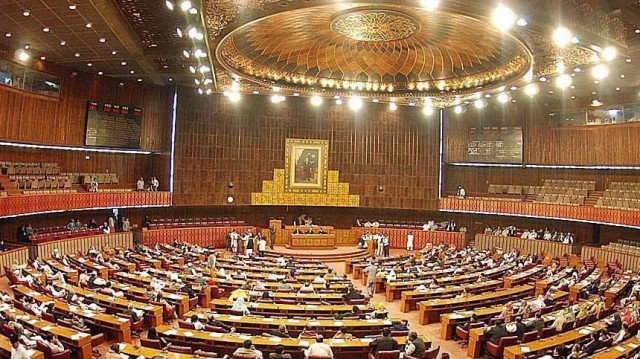Senate body rejects varsity at PM House
Members say university in security zone not feasible

The Senate Standing Committee on Education and Vocational Training on Tuesday rejected a bill seeking to establish a university at the Prime Minister House.
The bill, which has already been passed by the National Assembly, was rejected by a five-one majority vote.
The senate standing committee meeting was held under the chair of Senator Irfan-ul-Haq Siddiqui.
The committee rejected “The Establishment of Pak University of Engineering and Technology Bill 2022”.
The standing committee observed that the existing education system should be improved by properly utilizing the budget instead of setting up a new university. The committee suggested that new subjects be added to existing universities and that financial resources be used for the betterment of existing institutions.
The committee also discussed security concerns of the establishment of a university on the premises of the Prime Minister's House. The committee observed that establishing a university in a high-security zone did not seem feasible. The majority of the committee members rejected the bill after deliberation while Senator Fauzia Arshad abstained from voting on the bill.
The committee also recommended the construction of a special school for transgender persons to promote social inclusion and equality for the transgender community.
The committee also expressed anger over the absence of the vice-chancellor of the University of Peshawar who had been summoned to explain the position on the problems being faced by the teaching and non-teaching staff of the university.
The committee chairman also directed to hold a joint meeting between the vice-chancellor, teaching staff and the administration to resolve the issues. The committee decided to visit the university and summon the VC at the next meeting.
Meanwhile, “The Right to Free and Compulsory Education (Amendment) Bill, 2022”, introduced by Senator Fauzia Arshad, was unanimously approved by the standing committee. The bill will provide opportunities for disadvantaged children ensuring that they get maximum education as per their constitutional right.
Senator Fauzia Arshad said that unfortunately there are many marginalized children in the Islamabad Capital Territory who are unable to get formal education due to their poor social and economic conditions.
The bill proposes a new way of teaching for such children, she said, adding that the government will educate the children in collaboration with NGOs, the corporate sector and international organizations.
The committee also approved development projects for education under the public sector development programme and projects related to the promotion and facilitation of women's education. The committee was informed that there are a total of 33 projects out of which 17 are ongoing and 16 are new projects. The present budget consists of a total of Rs12.489 million out of which Rs3.39 billion were to be provided by international donors and 9.04 from local funds.
The committee members said that 90 per cent of teachers across the country were untrained. The committee stressed the need for teacher training programmes and suggested introducing teacher training schemes this year.
Approving the proposed budget for National Heritage and Cultural Division, the committee chairman called for the construction of multi-purpose buildings to make full use of government resources for arts and literature. Senator Siddiqui also stressed that steps should be taken for the promotion and awareness of our cultural and historical heritage.
Published in The Express Tribune, March 16th, 2022.



















COMMENTS
Comments are moderated and generally will be posted if they are on-topic and not abusive.
For more information, please see our Comments FAQ